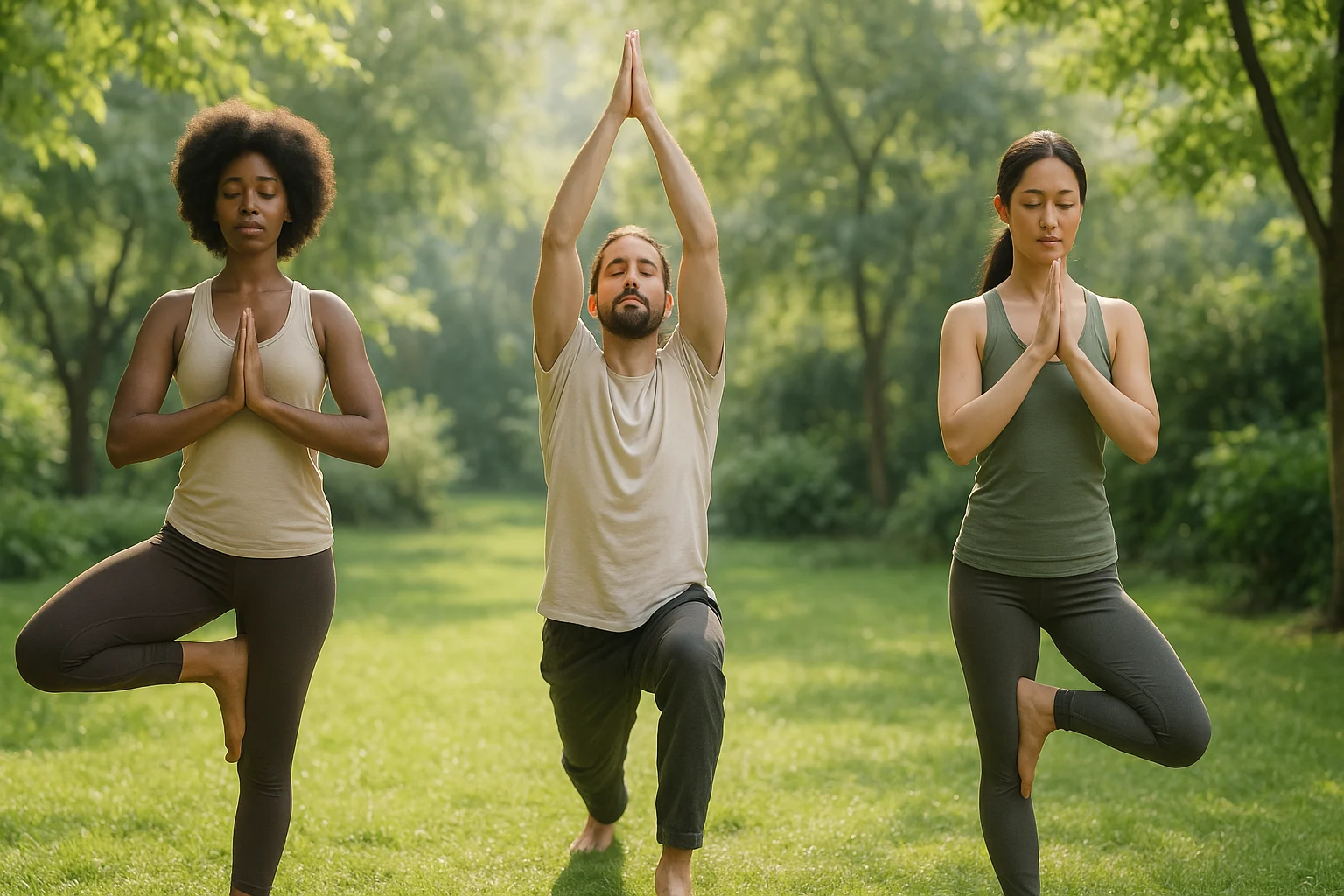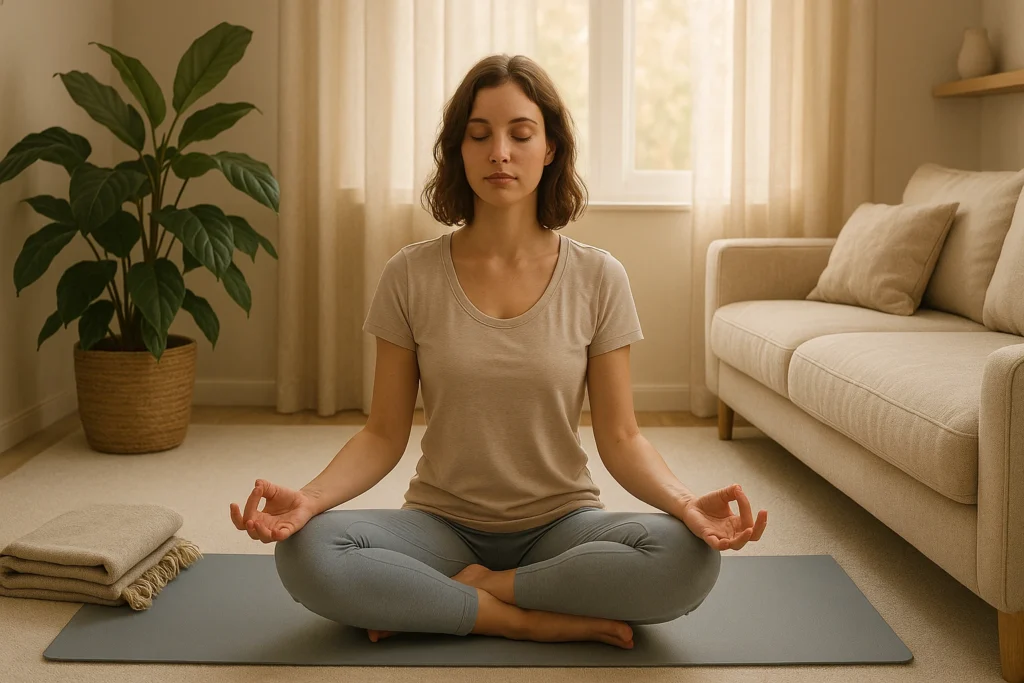
Ever wonder if yoga’s wisdom could actually change your day? The framework people often search as yamas niyamas yoga—ethical principles from Patanjali’s Yoga Sutras—offers a down-to-earth way to find steadiness and purpose. Picture choosing kindness instead of snapping in a hectic moment. How might these ancient guidelines fit your life right now? For the broader context beyond the yamas & niyamas, see our pillar guide, yoga philosophy guide.
Track Your Yoga Journey!Table of Contents
Yamas Niyamas Yoga: The Basics of Yoga Ethical Principles
When I first dove into yoga, Patanjali’s Yoga Sutras opened my eyes to an eight-limb path that’s all about finding inner peace—a true foundation of yoga philosophy. Picture it like climbing a ladder: each step builds on the last. The yamas and niyamas are the first two rungs, setting up an ethical base for everything else. Many teachers say these principles can “cleanse the mind,” helping you prepare for deeper practices. Without them, practices like poses or meditation might feel a bit hollow. Let’s explore these guidelines to live a more meaningful life. For an accessible external overview, see Kripalu’s guide to the yamas and niyamas.
“Yoga isn’t just about flexible bodies—it’s about flexible hearts and habits.”
This post has affiliate links. We may earn a commission. Learn more.
Mindful Learning Companion
Quick, calm insights from books and podcasts to deepen your yoga ethics and everyday practice—perfect alongside journaling.
Explore Blinkist now Partnered
The Five Yamas: Ethical Guidelines for Harmony
Think of the Yamas as your built-in compass—the little voice that tells you to breathe instead of snap back, or to hold the door for the person behind you. They’re ancient ethics, sure, but they’ve shaped how I navigate work, friends, and even the checkout line. Here’s how each one works in real life.

Ahimsa (Non-Violence)
Ahimsa means non-violence, but not just in the “don’t hit” sense. It’s in the way you think, speak, and even shop. Last winter, I caught myself ready to snap at a barista for messing up my drink—instead, I paused, smiled, and felt the tension melt. That tiny moment was Ahimsa in action. Choosing a plant-based meal or taking one slow breath before replying? Same thing. Try these:
- Offer a kind word today.
- Skip the self-critical thoughts.
- Make one eco-friendly choice.
Satya (Truthfulness)
Satya is truth with heart. It’s that moment you tell your best friend something hard—but you say it gently because you care more about connection than being “right.” I’ve had to do it at work, too, owning up when I botched a report. Awkward? Yes. But that honesty built trust I couldn’t have faked. Before speaking, ask yourself: Are my words kind, necessary, and true?
“Truth with kindness weaves stronger bonds.”
Asteya (Non-Stealing)
Asteya isn’t just about keeping your hands off someone’s wallet. It’s showing up on time so you don’t steal a friend’s afternoon, or giving credit when a coworker’s idea sparks your project. I once caught myself hogging the office printer—yep, that’s Asteya calling me out. Small moves, like using less water or citing a source, make this yoga moral guideline real.
Brahmacharya (Moderation)
Brahmacharya is about saving your energy for what lights you up. Ever spent an hour scrolling and felt drained? I have. Cutting back on screen time, eating a balanced lunch, or pouring energy into a meaningful chat instead of gossip—that’s Brahmacharya. It’s like recharging your battery for the stuff that matters.
Aparigraha (Non-Possessiveness)
Aparigraha is letting go of what weighs you down. Last month, I donated a pile of clothes I hadn’t worn in years—total freedom. It’s also about not clinging to how things “should” go, like when a project flops. Accepting setbacks with grace or clearing out your desk? That’s Aparigraha, making space for simplicity.
The Five Niyamas: Practices for Inner Growth
If the Yamas guide how we show up with others, the Niyamas shape how we look after ourselves. I never would’ve grouped brushing my teeth, journaling, and meditating together—yet they all live here. Let’s walk through them, one by one.
Saucha (Cleanliness)
Saucha is about keeping things clear—body, mind, and space. A tidy desk helps me think, and a simple, nourishing meal feels like a reset. One mindful breath can sweep away mental cobwebs, too. It’s spring-cleaning for the inside, making room for deeper yoga practice.
Santosha (Contentment)
Santosha is finding joy in the now, even when life’s messy. When a work deadline loomed, I jotted down three things I was grateful for—coffee, sunlight, my dog—and my stress eased up. Try listing your own gratitudes or smiling through a challenge to feel the effect of this Niyama.
“Contentment makes every moment a little brighter.”
Tapas (Self-Discipline)
Tapas is the spark of discipline that keeps you going. I’ve dragged myself out of bed for a five-minute meditation when I’d rather sleep—and it often feels worth the effort. Saying no to late-night snacks or sticking to a quick walk builds that inner fire. Start small, and Tapas grows stronger.
Svadhyaya (Self-Study)
Svadhyaya is about knowing yourself. Journaling why a comment stung or reading a page of the Yoga Sutras has helped me see my patterns. Last week, I asked myself, “Why am I so annoyed?” and uncovered a hidden stress. This practice fits everyone, from yoga newbies to pros.
Ishvara Pranidhana (Surrender)
Ishvara Pranidhana is trusting life’s flow. For me, it’s letting go of worrying about a job interview’s outcome and believing challenges teach me something. Whether you see it as the universe or just life’s rhythm, surrendering brings peace—especially when things feel out of control.

Yoga Moral Guidelines: Why Yamas & Niyamas Matter
For me, the Yamas and Niyamas are what make yoga stick. They’re why I can actually sit still for meditation instead of thinking about laundry. In contemporary commentary, the yamas and niyamas are often described as “cleansing” the mind—preparing you for deeper practices like breathwork. Here’s why they can be transformative:
- Character Building: Truth and kindness shape who you become.
- Mental Clarity: Ethical choices can reduce guilt, easing meditation.
- Living Yoga: These yoga moral guidelines turn daily life into practice.
“Yamas and Niyamas clear the mind for deeper insight.”
How to Practice Yamas Niyamas Yoga Daily
Bringing the yamas and niyamas into your life is easier than it sounds—just start small. Here’s how I’ve woven these ethics into my days, from morning coffee to evening wind-down:
Practical Yamas Niyamas Guide
Use this yamas niyamas guide as a quick checklist you can return to daily.
- Pick One Principle: Try Ahimsa by skipping gossip or Santosha with a gratitude list.
- Stay Mindful: Pause and ask: Is this truthful? Am I content? Check out mindfulness techniques to stay present.
- Journal: Write a quick note on how a principle showed up today.
- Take Small Steps:
- Ahimsa: Share a compliment.
- Satya: Speak honestly, but kindly.
- Asteya: Respect someone’s time.
- Brahmacharya: Cut one distraction.
- Aparigraha: Donate something unused.
- Saucha: Tidy one corner.
- Santosha: List three gratitudes.
- Tapas: Stick to a tiny routine.
- Svadhyaya: Read an inspiring page.
- Ishvara Pranidhana: Let go of one worry.
Can beginners try this? Absolutely. You don’t need to nail a headstand to practice kindness or focus. Pick one principle and watch it ripple through your day.
Yamas Niyamas Yoga Self-Check Tool
Curious how yamas niyamas yoga fits into your life? Click a principle below to uncover its meaning and get practical tips to try it today.
Discover Your Yoga Ethics
Select a Principle
Click a button above to learn about a Yama or Niyama and get practical tips to integrate it into your life.
Frequently Asked Questions
Conclusion: Live Yoga Every Day
Over the years, the yamas and niyamas have been my quiet compass. Non-violence, truthfulness, contentment—they’ve turned arguments into conversations and traffic jams into mini breathing sessions. Pick just one today. Practice it on your commute, at lunch, or in the grocery line. Notice what changes—no pressure, just curiosity.
Sleep & Stress Snapshot
If you’re working with Santosha or Svadhyaya, a quick at-home check can fine-tune journaling, breathwork, and rest—without guessing.
Check your levels mindfully Partnered
Use code Max15 for 15% off sitewide.
Not medical advice; consult a healthcare professional for personal guidance.


